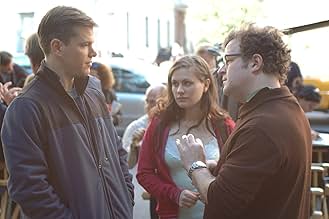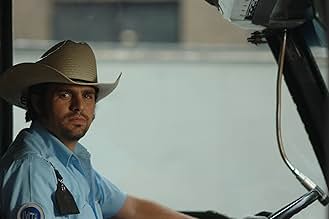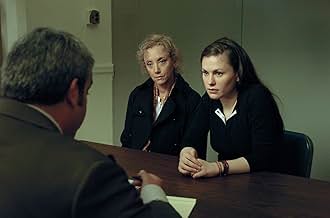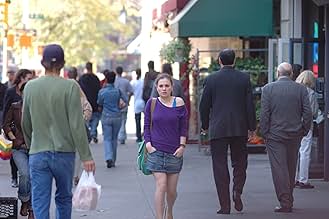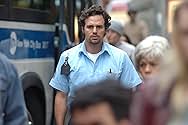CALIFICACIÓN DE IMDb
6.5/10
19 k
TU CALIFICACIÓN
Una joven es testigo de un accidente de autobús y queda atrapada por las secuelas. La cuestión de si fue o no intencionado afectará a la vida de muchas personas.Una joven es testigo de un accidente de autobús y queda atrapada por las secuelas. La cuestión de si fue o no intencionado afectará a la vida de muchas personas.Una joven es testigo de un accidente de autobús y queda atrapada por las secuelas. La cuestión de si fue o no intencionado afectará a la vida de muchas personas.
- Dirección
- Guionista
- Elenco
- Premios
- 10 premios ganados y 18 nominaciones en total
- Dirección
- Guionista
- Todo el elenco y el equipo
- Producción, taquilla y más en IMDbPro
Opiniones destacadas
10abneuman
A truly heart wrenching story, "Margaret" reiterates Kenneth Lonergan's gifts for dialogue, story, and his ability to treat the most dramatic themes with artful humor, awareness and perception. The acting is exceptional; even relatively small parts, (played by actors such as Matthew Broderick, Matt Damon, Mark Ruffalo, and Allison Janey) showcase both the actors' own remarkable abilities as well as Lonergan's attention to detail. It is Matthew Broderick's character who is the only one to utter the movie's title as he recites a poem by Gerard Manley Hopkins. J. Smith Cameron and Anna Paquin, who play mother and daughter, both deliver fierce performances which form the relationship that serves as the backbone of the film. Taking on issues from abortion, divorce, and death to the inherent isolation of being human, the movie has a life and humor to it which cannot be brought down by the weightiness of these issues.
6mbs
The film is just over two and a half hours long and while it doesn't fly on by--it doesn't slowly crawl on by either. There are a lot of scenes that flow really really nicely into other scenes that might not have to do with the main plot line but seem to belong in the movie all the same. I can kind of see why the writer/director had trouble trimming it even at two and a half hours, its hard to tell where or what to trim since the main plot line of the movie isn't really the point so much as all the establishing things that contribute to Lisa's mood and state of mind as the movie progresses. (i think) If you're reading this you probably already know the main plot line--teenage girl Lisa causes massive bus accident resulting in a single death, and spends the rest of the movie both breaking down emotionally and trying to right what she feels she did wrong. (the accident is really, really not entirely her fault, but she feels enormous guilt just the same as she should) Anna Paquin gives an incredible performance here--i don't just mean that Paguin's performance is really emotional (which it is)--or that she feels like a real life teenager here (so confident in her rightness, so prone to outbursts when her rightness isn't so right) i mean that Paquin's performance really, pretty much completely single-handedly holds this entire jumble together into one coherent narrative--and for that she's almost like Kenneth Lonnigran's equivalent to Ben Gazzara here. We follow her as she runs into all sorts of people, and we follow her thru all of her mood swings and somewhat pointless arguments that she picks with some of these people, and completely well reasoned arguments that she picks with others...she's the kind of well intentioned but guilt racked protaginist you would expect to find in a novel or a play, or maybe a really good ongoing TV series--but definitely not a film with a definitive arc which is what makes her character that much more surprising.
The film really did call to mind some of John Cassavettes' films in both its rambling yet always moving forward (but never exactly straight forward) narrative and the many, many set pieces consisting of minute characters just talking....not to mention all the natrualistic scenes of Lisa just hanging out in her element. (meaning in school, with friends, arguing with her mom, etc) Movie is very very dialog heavy and yet somehow it never comes across as trying to strong-arm you into a specific point of view, at least until the last half hour or so--as its main character eventually and forcefully takes one on of her own.
This is a movie that for all of its strengths has plenty of weaknesses in it as well. For one thing I'm not sure what the heck Jean Reno is doing here exactly. I'm only slightly less curious about what the heck Matt Damon is doing here also. (was he supposed to be Lisa's moral compass? because his character doesn't really make any sense really. If there's one character who seems like he should have had more screen time it would have to be him) i'm not enitrely sure why we keep cutting back to Matthew Broderick who outside the scenes of him moderating English class debates (?!?!) doesn't seem to have much of a character to play. i'm not entirely sure the ending justified the extreme buildup--i'm also not sure how realistic that ending decision actually is either, but i'll let that go just because the movie had to have an ending. Even tho I enjoyed the constant cutting back to Lisa's mom's storyline (J Smith Cameron is pretty good here too i should point out)--i'm not even sure all of that was necessary to tell Lisa's story so thoroughly--even if the relationship between the mom and the daughter i think is supposed to be the backbone of the movie...and yet with all of these questionable elements just kind of thrown on in there one on top of the other, (like they're all so tightly wound together that it would be hard to pick one off without feeling like something was missing i should add)--- the movie does remain really quite watchable right up until the end--anchored very nicely by the excellent work of Anna Paquin so really that's a feat just by itself i think. This is a film that will be overrated by some, and too easily dismissed by many others...yet this definitely is a challenging film and one that i think should make a pretty good civics lesson to some high school/college students in the years ahead--provided schools are still teaching civics in the years ahead.
The film really did call to mind some of John Cassavettes' films in both its rambling yet always moving forward (but never exactly straight forward) narrative and the many, many set pieces consisting of minute characters just talking....not to mention all the natrualistic scenes of Lisa just hanging out in her element. (meaning in school, with friends, arguing with her mom, etc) Movie is very very dialog heavy and yet somehow it never comes across as trying to strong-arm you into a specific point of view, at least until the last half hour or so--as its main character eventually and forcefully takes one on of her own.
This is a movie that for all of its strengths has plenty of weaknesses in it as well. For one thing I'm not sure what the heck Jean Reno is doing here exactly. I'm only slightly less curious about what the heck Matt Damon is doing here also. (was he supposed to be Lisa's moral compass? because his character doesn't really make any sense really. If there's one character who seems like he should have had more screen time it would have to be him) i'm not enitrely sure why we keep cutting back to Matthew Broderick who outside the scenes of him moderating English class debates (?!?!) doesn't seem to have much of a character to play. i'm not entirely sure the ending justified the extreme buildup--i'm also not sure how realistic that ending decision actually is either, but i'll let that go just because the movie had to have an ending. Even tho I enjoyed the constant cutting back to Lisa's mom's storyline (J Smith Cameron is pretty good here too i should point out)--i'm not even sure all of that was necessary to tell Lisa's story so thoroughly--even if the relationship between the mom and the daughter i think is supposed to be the backbone of the movie...and yet with all of these questionable elements just kind of thrown on in there one on top of the other, (like they're all so tightly wound together that it would be hard to pick one off without feeling like something was missing i should add)--- the movie does remain really quite watchable right up until the end--anchored very nicely by the excellent work of Anna Paquin so really that's a feat just by itself i think. This is a film that will be overrated by some, and too easily dismissed by many others...yet this definitely is a challenging film and one that i think should make a pretty good civics lesson to some high school/college students in the years ahead--provided schools are still teaching civics in the years ahead.
This is the Theatrical Cut...What to say of the film? I definitely enjoyed it at times, and it had some powerful scenes and acting. Paquin in particular has some very impressive moments, and the characters here are all interesting. It's hard to really grasp the characterization at times, and the melodramatic moods that go along with the different plot lines make for a very interesting, very unique, spin. The film is never flat out dull, and there's always a hint of genius behind it all, but ultimately it feels like a structurally messy composition of story lines. It's a very odd, inconsistent film, and even Paquin's portrayal and character is hard to wrap your finger around. Like I said, there are moments of brilliance, but also scenes that I didn't care for at all and scenes that left me feeling nothing other than confusion as to why they were there. I get the impression that the writer/director is really trying something here, and sometimes it felt like he succeeded, but as a film there's one too many flaws. The editing is rather distracting, and while it worked at times there's no reason why it shouldn't have been much better in certain moments. Scenes come and go without any particular flow, and it really hurts the film.
Ultimately, this is a frustrating, uneven, incohesive film with inconsistent characters and a pretty great, but again inconsistent, main performance by Anna Paquin. Don't be fooled, there are great moments sprinkled in here, and Lisa's classroom scenes really resonate, but it's just not enough to recommend. I wish I actually wanted to seek out the Extended Cut, but I really don't. I know many people will read this and say I "didn't get it" and that's fine since it works both ways for all film buffs, but I'm not a fan, and the more I think about it the less I like it. At least it's not boring.
Ultimately, this is a frustrating, uneven, incohesive film with inconsistent characters and a pretty great, but again inconsistent, main performance by Anna Paquin. Don't be fooled, there are great moments sprinkled in here, and Lisa's classroom scenes really resonate, but it's just not enough to recommend. I wish I actually wanted to seek out the Extended Cut, but I really don't. I know many people will read this and say I "didn't get it" and that's fine since it works both ways for all film buffs, but I'm not a fan, and the more I think about it the less I like it. At least it's not boring.
Shot back in 2005, after a long history of editing problems, this film finally got released in 2011, and debuted on DVD in 2012, with an extended director's cut (I guess) included. Unfortunately, I accidentally watched the shorter (still two and a half hour) version. I'm not sure I'd want to sit through another half hour of this. It's a good film, at its heart. The story is very good, anyway. My big problem with it is that the central character, played by Anna Paquin, is such an unlikeable, pretentious little snot I eventually just stopped caring about what was going on. It's a totally realistic depiction of a teenager, but it reminds me how much I hate teenagers, or at least teenagers like her. Frankly, most of the rest of the characters are equally as obnoxious. I was extremely glad to see Jeannie Berlin call Paquin out on her bullcrap, but she's just as detestable. I found it hilarious that Paquin mistakenly calls her "strident," which she thinks means "pig-headed" or something but which actually means "shrill." The whole film is honestly pretty shrill. The story revolves around Paquin causing a bus accident. At first, she lies about it, then later she feels bad about it and tries to recant her statement.
On the day of its cinema release, Kenneth Lonergan's long-gestating drama was the most successful film in the UK. Problem was, it only opened on one screen. The story of Margaret's production is likely a fascinating story in itself, not least because of Martin Scorsese and Thelma Schoonmaker's input into the final edit, which was presumably a return favour for Lonergan's work on the screenplay for Gangs of New York. But I'll focus on the fascinating story that Lonergan has told with this film.
Ostensibly the tale centres on a New York schoolgirl named Lisa (Anna Paquin, defining her young adulthood just as she defined herself in childhood with The Piano), who inadvertently causes a fatal road accident. What follows is the emotional aftermath, fought outwardly with her mother, as a moral and ethical war wages within her hormone-ravaged body.
The performances are excellent throughout, particularly Paquin and J. Smith-Cameron as the daughter and mother caught in gravitational flux. Jean Reno gives fine support as the sad-sack Ramon, while Matthew Broderick delivers the poem (by Gerard Manley Hopkins) that provides the film's title, while suggesting the entire life of his character by the way he eats a sandwich. It's that kind of film.
I recently wrote a review of Winter's Bone, which I described as an anti-youth movie. Margaret could be a companion piece in this regard, cautioning against the bright-eyed naivety of youthful independence, and promoting the importance of family. Like Winter's Ree, Lisa is a lost soul; unlike Ree, Lisa is not someone we admire. But she is always in focus; Lonergan expects not for us to like her, only to understand her. In maintaining this focus, Lonergan himself achieves the admirable: weaving a narrative whose minute details and labyrinthine arguments mirror the broader existential vista against which they are dwarfed.
Margaret goes deeper than Winter's Bone, delivering something pleasingly unexpected: a kind of Sartrean modern fable about the isolating nature of subjectivity. Like her actor mother on the stage, and like us all in our semi-waking lives, Lisa is the main player in her great opera. She performs the social functions that enable her to cling to a sense of belongingness, but something gnaws at her soul. And when, after the accident, she seeks some kind of meaning, she is met at once by indifference, before being seduced by those very institutions that make indifference normal. Nothing in the material world satisfies Lisa; nothing can match her aspirations. The suggestion here, I feel, is that our despair emerges from the disparity between that which we hope for and that which reality can deliver.
No wonder it took so long to find its way to a single UK screen: a three-hour existentialist play is a tough sell. Ten years after the towers sank to Ground Zero, Margaret joins There Will Be Blood, The Assassination of Richard Nixon, and (for some) Zodiac in the pantheon of modern classics that map the American psyche in the post-9/11 world.
Ostensibly the tale centres on a New York schoolgirl named Lisa (Anna Paquin, defining her young adulthood just as she defined herself in childhood with The Piano), who inadvertently causes a fatal road accident. What follows is the emotional aftermath, fought outwardly with her mother, as a moral and ethical war wages within her hormone-ravaged body.
The performances are excellent throughout, particularly Paquin and J. Smith-Cameron as the daughter and mother caught in gravitational flux. Jean Reno gives fine support as the sad-sack Ramon, while Matthew Broderick delivers the poem (by Gerard Manley Hopkins) that provides the film's title, while suggesting the entire life of his character by the way he eats a sandwich. It's that kind of film.
I recently wrote a review of Winter's Bone, which I described as an anti-youth movie. Margaret could be a companion piece in this regard, cautioning against the bright-eyed naivety of youthful independence, and promoting the importance of family. Like Winter's Ree, Lisa is a lost soul; unlike Ree, Lisa is not someone we admire. But she is always in focus; Lonergan expects not for us to like her, only to understand her. In maintaining this focus, Lonergan himself achieves the admirable: weaving a narrative whose minute details and labyrinthine arguments mirror the broader existential vista against which they are dwarfed.
Margaret goes deeper than Winter's Bone, delivering something pleasingly unexpected: a kind of Sartrean modern fable about the isolating nature of subjectivity. Like her actor mother on the stage, and like us all in our semi-waking lives, Lisa is the main player in her great opera. She performs the social functions that enable her to cling to a sense of belongingness, but something gnaws at her soul. And when, after the accident, she seeks some kind of meaning, she is met at once by indifference, before being seduced by those very institutions that make indifference normal. Nothing in the material world satisfies Lisa; nothing can match her aspirations. The suggestion here, I feel, is that our despair emerges from the disparity between that which we hope for and that which reality can deliver.
No wonder it took so long to find its way to a single UK screen: a three-hour existentialist play is a tough sell. Ten years after the towers sank to Ground Zero, Margaret joins There Will Be Blood, The Assassination of Richard Nixon, and (for some) Zodiac in the pantheon of modern classics that map the American psyche in the post-9/11 world.
¿Sabías que…?
- TriviaOriginally scheduled for release in 2007, but writer/director Kenneth Lonergan spent four more years struggling with Fox Searchlight Pictures over the final cut, resulting in several lawsuits.
- ErroresWhen Lisa comes home after the accident, throws up and hugs her mother, there's no blood on her arms and hands. In the next shots under the shower, there is plenty.
- Versiones alternativasExtended version released on DVD runs for 178 minutes.
- ConexionesFeatured in Maltin on Movies: Ice Age: Continental Drift (2012)
Selecciones populares
Inicia sesión para calificar y agrega a la lista de videos para obtener recomendaciones personalizadas
Detalles
Taquilla
- Presupuesto
- USD 14,000,000 (estimado)
- Total en EE. UU. y Canadá
- USD 46,495
- Fin de semana de estreno en EE. UU. y Canadá
- USD 7,525
- 2 oct 2011
- Total a nivel mundial
- USD 469,264
- Tiempo de ejecución
- 2h 30min(150 min)
- Color
- Mezcla de sonido
- Relación de aspecto
- 1.85 : 1
Contribuir a esta página
Sugiere una edición o agrega el contenido que falta




